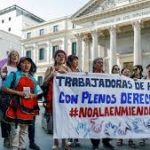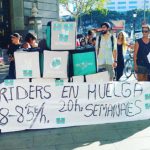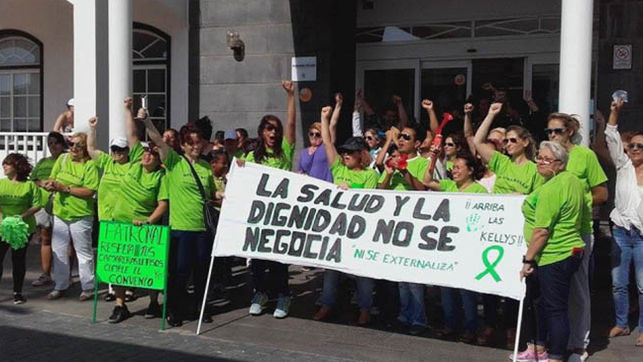THE APRIL GENERAL ELECTION OPENED THE POSSIBILITY TO FORM A GOVERNMENT OF THE LEFT. AFTER MANY NEGOTIATIONS WITH ADVANCES AND RETREATS HOWEVER, THE SITUATION STALLED AND THE SOCIALIST PARTY (PSOE) REFUSED TO INCLUDE MINISTERS FROM “UNIDAS PODEMOS” (UP) IN ITS GOVERNMENT.
Pablo Iglesias Turrion leads ‘Unidas Podemos’ (UP), an electoral alliance made of Podemos, United Left, Equo and other left wing parties. UP was formed in 2016.
Pressure for the PSOE to reject UP had come from the European Union, from the stock market index (IBEX 35) and from the bourgeois class generally. Not surprising really, considering how directly the UP’s programme clashes with the interests of the top employers. Here it goes :
-
Right to dignified and stable jobs and secure pensions. Scrap the Labour Reform.
-
Defend the public services by recovering the original investments made in them, and now using these for health, education and social services.
-
For public policies that work towards equality.
-
Transform the depopulated areas and guarantee public services in all outlying areas.
-
Revoke the Mordaza law [1].
-
Control the rents, stop speculation, secure the right to housing, enlarge the public housing stock.
-
Raise taxes on those who can pay, to guarantee social justice.
-
Stand up to the Climate Emergency crisis. Reform the energy market.
In no way is the PSOE prepared for such measures. At the last moment in the negotiations, it referred to changes to be made to the Labour Reform, the pensions and the Ley Mordaza. These offer mild upgrades in health and education, but they do not set out to reverse the privatisations. It is these however that cripple the public services, the working class and the poorest people in society.
Spain is expected to respect its commitments to Europe, but these commitments stifle the country’s growth. On top of the public deficit and the cap on the pensions’ rises, the amount needed to service the interests on the debt is close to GDP (Gross Domestic Product). The Mochila Austriaca [2] – apparently intended for all the EU countries – is due to start in 2020 in Spain. That measure amounts to the ‘financiation’ of the workers’ pensions. It is up to the workers to self-insure, including against their own unemployment. The employers are favourable to this. It makes them freer to sack people.

Europe is entering a new crisis. Recession is starting in Germany, affecting all the other economies. Faced with grave difficulties, the German and French banks look for partial solutions in the European Private Pensions Plan (PEPP) [3].
The way capitalism resolves its contradictions is by concentrating, and by eliminating the workers’ rights and the conquests won by the workers’ movement. The most recent Labour Reform, passed under Rajoy (in 2012) increases precariousness and degrades the conditions of life.
The structural weakness of Spanish industry causes it to demand labour flexibility and lower wages, to compete on the world market. The Labour Reform must be scrapped therefore if the workers are to recover rights, decent salaries and job stability.
Pressured by the big capitalist countries and the employer’s class in Spain, the Socialist Party does not set out to adopt policies in the direct defence of the working class.

The Mordaza Law does not just curtail the freedom of expression. It criminalises the struggle of the working class. It licenses the prosecution of trade union leaders and strike pickets, as well as of occupations and expropriations. The trade unions are insufficiently committed to the defence of the workers’ interests. It is too mildly that the big unions, the Workers Commissions and the UGT (similar to the TUC) intervene in the political debate for jobs and wages. And they offer no programme or tactics to confront the crisis of capitalism in Spain.
The measures that the unions defend at the moment can be utilised to sanitise the system. The unions need a programme that addresses this situation: the revocation of the Labour Reform will not happen without working class pressure, mobilisations, general strikes.

These last few months have witnessed many strikes. The security personnel intervened at Barcelona airport, along with the Iberia ground staff and those working for the company that distributes fuel to the main airlines. There was also the strike that forced Ryanair to save four of its bases in Spain [4]. The equivalent of the ‘deliveroo’ riders, as well as the ‘Kellys’ – the hotels’ chambermaids (on our featured image) – continue their fight for recognition and a decent minimum wage. Because these working class sectors are not central to the proletariat, their actions give a measure of the state of animation that exists in the wider layers of the working population.

The growth of the social movements: Ecologists, feminists, LGTBI, the Mareas (social tides for change animated by pensioners, health workers and others) indicate the determination of large social layers not to surrender, not to accept the consequences of this crisis. In their actions, they tell everyone how to uphold demands and bring change to society. Because they do not find the necessary responses in the left or the trade unions, they launch their own struggles without waiting for the leaders. They stand up for themselves and bring along their transformative proposals.
The plan of the Socialist Party to reach an accord at government level is very far from social necessity. It combines some degree of defence of social rights with its political alignment on the European Union and the commercial treaties like CETA, TTIP or the EU-Mercosur accord; but the latter leave the public services wide open to the market and the looting of the multinationals.
The European Union has warned Spain that it cannot lower taxes or increase public spending to adjust a balance of payments or contain the deficit [5]. This ties the hands of this new government. It places conditions on its ability to invest in social projects, or struggle against the precariousness and the low wages.
One must not expect any answers from the European Union. It represents the interests of big capital and the multinationals. In their pursuit of financial concentration, all what big capital and the multinationals want is cuts: cuts in the workers’ rights and cuts in the workers’ conquests.
The foreign policy of the PSOE was starkly revealed when it took Guaido’s side in Venezuela. And this, even before the European bourgeoisie had yet said anything. Prime Minister Pedro Sánchez (and ex-leader of the PSOE) lined up behind imperialism in its condemnation of Maduro. He also stayed silent when the international blockade was imposed on Venezuela (this April) although this is the basic reason for the economic distress of that country.
In these circumstances, it is going to be very difficult to consolidate a Government of the Left with social policies at its core. The programme of the Socialist Party bends under the pressure of the apparatus of capitalism. This is clearest at the level of the government’s economic policies, all of them antagonistic to the programme of Unidas Podemos.
A debate to concretise a Government of the Left took place in Parliament and its bilateral Commissions, but with no input from the Assemblies or the resolutions of the Circulos [6]. The latter were making important proposals, but they were not amounting to a programme of economic and social transformation either. As Trotsky said, you cannot have a Front of the Left, and consequently a Government of the Left, without impelling a process of nationalisations. For the country to develop, energy, transports, communications and the social services must be in the hands of the State, under the control of the trade unions and the working class.
At the point when the Socialist Party refused to govern in coalition with Podemos, the latter should have continued to support the Socialist Party from the outside. This would have allowed a government to form and beat the political impasse. The fact that new elections are now due (for November) shows the limitation and weakness of this socialist leadership. It shows itself unprepared for measures, even if timid ones, to face the facts of this capitalist crisis.

Iñigo Errejón who formed the break-away group inside Podemos called “Mas Madrid”.

















